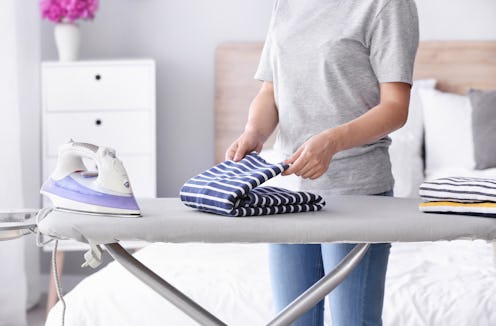Life

Staying on top of household chores can be difficult for anyone. Once you procrastinate on one load of laundry or dishes, it can feel like the mountain of dirty clothes or plates just keeps growing and growing until it's ready to swallow you whole. Unfortunately, it can be especially easy to fall behind on cleaning if you live with a disability that causes chronic pain, flares, depressive episodes, or other symptoms. However, according to people with chronic illness, staying a bit more organized at home sometimes comes down to adopting a few new habits, creative hacks, and techniques for tidying up.
The truth is, while the motivation and energy to stay on top organizing when you're chronically ill is not always there, having a space you feel comfortable and safe in can make a huge difference to your overall sense of wellness (speaking from experience, here). As Shelly Lotz wrote in an article about living with depression and cleaning for The Mighty, "I feel less weighed down by my surroundings and can breathe a little easier, knowing I finally accomplished a few things I had been putting off. I am still searching for the end of this mental tunnel, but having a clean physical path is definitely helping."
If you're unsure of where to begin, here are seven tips that people living with chronic illness use to keep their apartments tidied up, even on the most difficult days.
1
Beth, 24
"I have bipolar disorder, so I go through periods of cleaning a lot, and being very organized and on top of things (when I'm hypomanic) to being more disorganized, and having things get away from me a little bit during depressive periods," Beth explains. "To deal with cleaning during depressive periods, I usually just try to do one or two very small things a day. Any little thing I can manage is a victory, and I try to celebrate that to help be supportive of myself."
She says that she tries to focus to building simple but "good organizational habits," such as putting clothes in the laundry or putting dishes away. "Those help prevent things getting too disorganized when my mental illness limits my ability to be productive."
2
Kari, 30
Kari says, "I have MS, and I use the KonMari method once a month. It’s changed my relationship with the things I own."
3
Whitney, 25
"I am super forgiving of myself when I don’t do things. I used to be anxious and stressed out about getting things done, since getting sick, I have had to learn forgiveness," Whitney says. "Google tasks has helped me keep track of routine and non-routine tasks," she explains, adding that she uses clear containers, label markers, stickers, and pens to stay on top of organization.
4
Kelsey, 29
Kelsey, who lives with multiple mental and physical chronic illnesses, says that building a "sanctuary spot" in her home that is always tidy and filled with plants so she can meditate there during flare-ups has been key. "My partner knows this space is never to have clutter in it and when I'm there, I'm not to be disturbed barring a true emergency," she explains.
Moreover, Kelsey says, "My memory is really bad so I keep a lot of physical reminder things. For example, we keep both a physical and digital calendar for doctor appointments and other events we both need to know. The physical calendar is a large whiteboard in the kitchen. I also keep note pads in the kitchen, living room, and bathroom for 'to buy' lists because of my memory issues. I also use an app called 'Things' for to-do items and I put every little thing in it because I can never remember."
5
Polly, 45
Polly says that using Marie Kondo's KonMari method to organize her clothes and to shop has helped her stay grounded during depressive episodes. "It shifted my perspective on 'stuff' in general. That having been said, I read about Marie herself before I read her book, and liked the way she views life in general, so I think maybe that’s why it clicked for me," she explains. When Polly's feels extra overwhelmed by her depression and "cleaning feels impossible," she tells Bustle she still makes the bed every day.
6
Aubri, 33
"One small thing that I do to help me stay on top of organization when I’m dealing with my chronic illness is to keep things in the same places, always. I keep my medications — daily and rescue — in my bedside table. Then, if I’m stuck in bed, I can still get to my meds. I take time each week to sort my pills into A.M./P.M. sorters, and now I can tell at a glance if I’ve missed a dose," Aubrey says.
"I also use my personal planner to log basic housekeeping tasks via a checklist system. This helps me prioritize organizing and cleaning tasks based on the last time they were done, and what I have the physical energy to accomplish. This has really changed my life for the better."
7
Athena, 20
"I have an autoimmune disorder, a heart condition, anxiety, and depression that can often make me feel tired — especially when trying organize the apartment that my partner and I both live in," says Athena. "My organizational style is a very one-step-at-a-time approach. Every step is at least one step forward. It's like some days I run a 5k, and some days I just need to rest in order to be stronger later."
While it's not always possible to keep up with cleaning when you have a chronic illness, it's important to celebrate the little things — whether that's folding a couple items of clothing, or sweeping the floor. Taking things one at a time can help you conquer the clutter in your apartment, and make that last to-do list task a little less overwhelming.